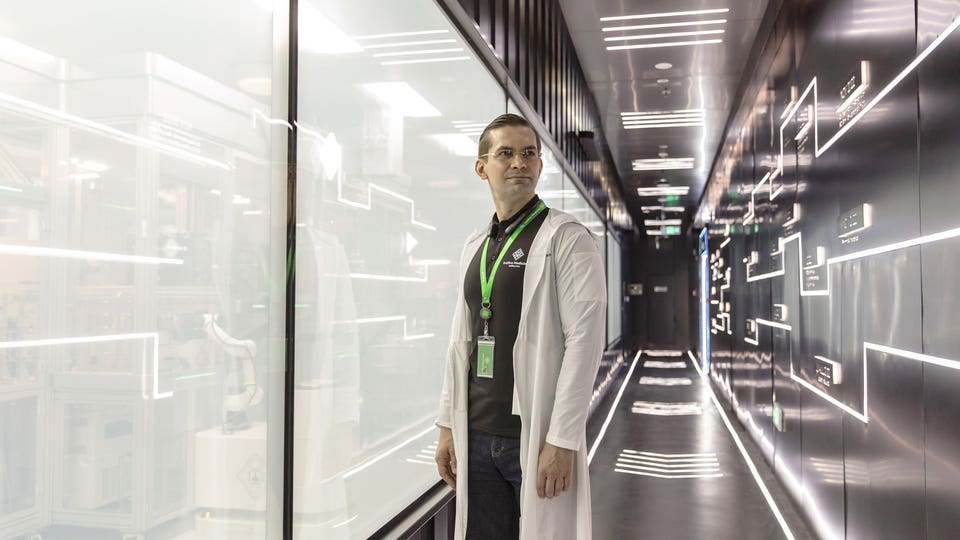Alex Zhavoronkov, founder and co-CEO of Insilico Medicine, at the company’s research facility in Suzhou, China, on October 31, 2023. In the crowded field of companies racing to discover the next blockbuster drug using artificial intelligence, Hong Kong and New York-based Insilico Medicine says it’s ahead of the pack. “We have achieved 17 preclinical candidates, which no other company has done before,” claims Alex Zhavoronkov, founder and co-CEO of Insilico, which is backed by blue-chip investors like Warburg Pincus and Qiming Venture Partners.
(Disclosure: Zhavoronkov is a contributor to Forbes . ) “In our entire pipeline, we had only one case in which we failed and then we actually restarted the program and succeeded in developing a preclinical candidate,” adds Zhavoronkov, who holds a Ph. D.
in physics and mathematics from Moscow State University. “So we basically have a very high probability of success. ” Insilico’s pipeline of AI-discovered drug candidates has most recently attracted Menarini Group, the privately-held Italian drugmaker controlled by billionaire Massimiliana Landini Aleotti and her family .
Earlier this month, Insilico entered into an agreement that could be worth more than $500 million to license a potential breast cancer drug to Stemline Therapeutics, a subsidiary of Menarini. Under the deal, Stemline Therapeutics will have exclusive global rights to develop and sell a novel molecule that could be made into treatment for cancers. The company will make an upfront payment of $12 million to Insilico, with the rest paid based on regulatory and commercial milestones.
Menarini CEO Elcin Barker Ergun says she found Insilico’s generative AI platform “one of the most advanced” among its peers. “Certainly, there is an influx of entries into the generative AI area, but Insilico’s capabilities include an end-to-end AI platform with a strong target discovery engine, AI generative molecule design, as well as clinical development optimization tools, which we look forward to utilizing,” she adds in a written response. To be sure, this potential breast cancer drug, as well as others in Insilico’s pipeline, may never make it to the market due to the nascence of AI-powered drug discovery technology.
The technology promises to cut down the time and cost involved in early-stage drug development, but has yet to yield a successful drug. Instead, several companies in the space, including U. K.
-based Exscientia and BenevolentAI, have been forced to abandon some of its candidates after they failed in trials. An AI-run robotic laboratory at the Insilico Medicine research facility in Suzhou, China, on October 31, 2023. Zhavoronkov founded Insilico in 2014 at the Johns Hopkins University campus in the U.
S. and set up its headquarters in Hong Kong in 2019. The Latvian scientist says Insilico’s AI platforms can produce a drug candidate that’s ready for human trials in about 20 months, at least twice as fast than the traditional approach.
He adds that the process is “significantly cheaper” than the conventional way, but declined to share the average cost because it “varies a lot” among different drug targets. The startup is currently working on 31 AI-discovered drug candidates in areas including cancer and fibrosis. Its lead candidate, a potential drug for idiopathic pulmonary fibrosis, an incurable lung disease, is in mid-stage human trials in the U.
S. and China. In September, Insilico sold the rights to develop and commercialize a potential cancer drug to Nasdaq-listed Exelixis for an upfront payment of $80 million.
To keep Insilico in the race to develop the world’s first AI-discovered drug, the startup filed for a Hong Kong initial public offering in June. The IPO application lapsed in December, but Zhavoronkov says he didn’t abandon the listing plan. He declined to reveal a timeline to take the company public, but says now is not a good time because of weak market sentiment.
According to its IPO prospectus, Insilico’s revenue skyrocketed more than six times to $30 million in 2022, while losses widened to $222 million during the same period from $130. 5 million in 2021. Besides Warburg Pincus and Qiming Venture Partners, its investors include Chinese billionaire Li Ge’s pharma giant WuXi AppTec and Pavilion Capital, a unit of Singapore state-owned investment fund Temasek.
A big revenue boost could come from pharma giants, many of whom are facing patent expiration of their money-spinning treatments. Large U. S.
and European pharma companies are at risk to lose $390 billion in annual sales through 2030 as key products lose their exclusivity and cheap generic versions of their drugs hit the market, Bloomberg analysts said last year. “Big pharma companies can either invest in internal R&D, which they know is going to be slow, or buy existing assets which we predicted to have a high probability of success,” says Zhavoronkov. “Our strategy is to become a really effective factory of high-quality preclinical and early-stage clinical assets, and satisfy the demand of big pharma companies that are facing patent expiration.
”.
From: forbes
URL: https://www.forbes.com/sites/zinnialee/2024/01/16/this-latvian-scientist-says-his-startup-is-winning-the-ai-drug-discovery-race/



